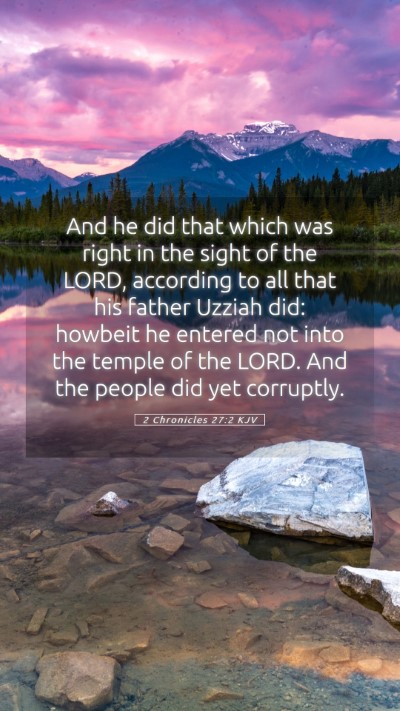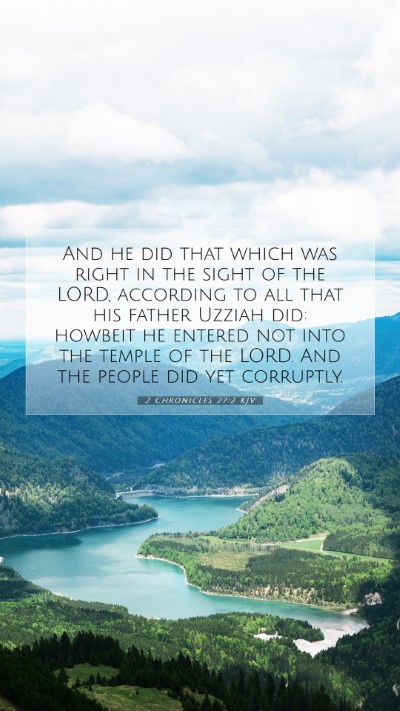Understanding 2 Chronicles 27:2
Verse (2 Chronicles 27:2): "And he did that which was right in the sight of the LORD, according to all that his father Uzziah did: howbeit he entered not into the temple of the LORD. And the people did yet corruptly."
Overview and Context
This verse refers to Jotham, son of Uzziah, who became king of Judah. His reign is notably marked by a commitment to righteousness, paralleling the earlier reign of his father Uzziah. However, the verse highlights a significant contrast in their practices concerning the Temple of the Lord.
Key Themes
- Righteous Leadership: Jotham's adherence to the righteousness that characterized his father is indicative of a positive legacy in leadership.
- Spiritual Shortcomings: Despite his good deeds, Jotham's avoidance of the Temple represents a spiritual deficiency.
- Cultural Corruption: The mention of the people's corrupt practices serves to highlight the broader moral decay within Judah during his reign.
Bible Verse Meanings According to Public Domain Commentaries
Matthew Henry Commentary
Matthew Henry emphasizes the importance of a king leading by example, and Jotham's righteous acts were commendable. However, his failure to enter the Temple raises questions about his faith and commitment to true worship. Henry notes that while Jotham did not lead the people into idolatry, his reign suffered due to the people's persistent corrupt ways.
Albert Barnes Commentary
Albert Barnes discusses Jotham's positive attributes as a ruler who was faithful to God's laws. However, Barnes points out that the royal neglect of the Temple signified a deeper issue of worship and spirituality within the nation. Jotham, much like his father, was recognized for his architectural and infrastructural advancements, yet this was overshadowed by the people's disobedience in worshiping other gods.
Adam Clarke Commentary
Adam Clarke elaborates on the symbolism of the Temple in Jotham's reign. He explains that entering the Temple represented more than just physical presence; it embodied a relationship with God. Clarke underscores that Jotham's overall righteous deeds were commendable, yet without participation in the sacrificial and worship practices, his actions fell short of fulfilling divine expectations.
Bible Verse Interpretations
2 Chronicles 27:2 serves as a profound reminder of the complexities of faith and leadership. While Jotham is characterized by righteousness, his avoidance of the Temple behavior illustrates a gap between personal integrity and communal spirituality. In biblical terms, this verse illustrates the critical importance of not just moral living but also the necessity of participation in communal worship and dedication to God.
Cross References
- 2 Chronicles 26:16-21: The reign of Uzziah and the consequences of pride.
- 2 Chronicles 28:1-3: The contrasting reign of Ahaz, who embraced idolatry.
- 2 Kings 15:32-34: The summary of Jotham's reign and his good works.
Application of Bible Verse to Daily Life
This verse encourages us to reflect on our own lives concerning righteousness and spiritual commitment. One might ask: do we merely engage in good deeds while neglecting our relationship with God? How can we actively ensure that we are not only living morally but also engaging in our spiritual practices and community worship?
Conclusion
In conclusion, 2 Chronicles 27:2 encapsulates the essence of righteous living juxtaposed with the importance of a heart oriented towards God. It serves as a reminder to believers that personal integrity must be coupled with a commitment to faith and community, as these elements together cultivate a genuine spiritual life.


